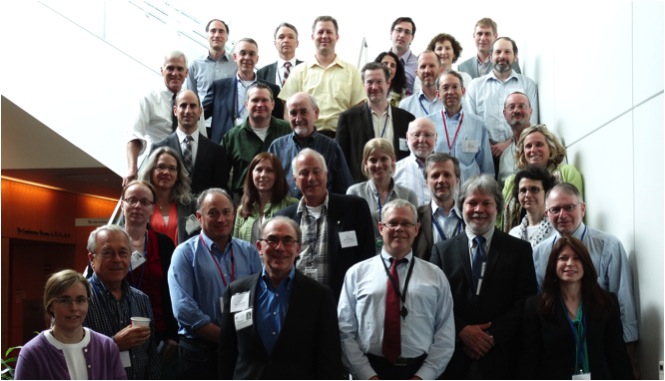Leaders meet at NIH to discuss future of Roseolovirus research
A team of HHV-6 investigators led by Wayne State University Professor Phil Pellett, PhD organized a one-day Roseolovirus Workshop at the NIH on June 2nd. The purpose of the meeting was to raise awareness and identify high priority research questions and critical unmet needs. Over 50 researchers and clinicians attended the workshop organized by Pellett and Co-Chair Mary Caserta, MD from University of Rochester. The workshop was funded with a grant from the NIAID, and support from the HHV-6 Foundation.

NIH Roseolovirus Workshop Attendees:
Front row (left to right): Amy Hudson, Peter Medveczky, Anthony Komaroff, Chris Beisel, Laurie Krug
Second row: Steven Zeichner, Philip Pellett, Leon Epstein
Third row: Ravit Boger, Steven Jacobson, Paolo Lusso, Vassiliki Boussiotis
Fourth row: Danielle Zerr, Cynthia Leifer, Emily Liebovitch, Richard Whitley, Kristin Loomis
Fifth row: Joshua Hill, Eain Murphy, David Hudnall, Keith Jerome, Patrick Daugherty, Jeffrey Cohen, Thomas Kristie
Sixth row: Terry Bowlin, David Mock, Brad Berges, Geraldina Dominguez, Mary Caserta, Lawrence Stern
Last row: John Nicholas, Louis Flamand, Jesse Arbuckle, Nathaniel Moorman
Speakers included Danielle Zerr for University of Washington on HHV-6 & 7 in the immunocompromised, Leon Epstein from Northwestern University on HHV-6 neurological complications in the immunocompetent, Richard Whitley from University of Alabama on antiviral therapy, Robert Gallo of the Institute for Human Virology on action strategies and Keith Jerome on diagnostic assays.
In addition to Phil Pellett and Mary Caserta, organizers included Christopher Beisel, PhD from NIAID, Leon Epstein, MD from Northwestern University, Amy Hudson from Medical College of Wisconsin, Laurie Krug, PhD from Stony Brook University, Nathaniel Moorman, PhD from University of North Carolina and Eain Murphy, PhD from Cleveland Clinic.
The organizers are hoping that increased awareness will eventually result in new funding. Although extramural funding for EBV, CMV and HHV-8 totaled over $300 million apiece over the past 12 years, only $15 million was awarded in the same time period for HHV-6 & 7 combined.
Dr. Pellett organized the first International Conference on HHV-6 & 7 in 1995 and has written extensively on the virus, including the chapter on HHV-6 & 7 in Field’s Virology. He explained that the idea for the workshop came after his team’s NIH grant proposal for research on the roseoloviruses was rejected. Dr. Pellett elaborated in his university’s E-News posting: “One of the issues is that people at NIH who are responsible for new research initiatives know little about roseoloviruses and their relevance to health. This has contributed to an absence of funding opportunities and omission of appropriate subject matter experts on review panels,” he said. “My co-investigators and I met with our NIH program officer, Chris Beisel, over lunch one day at last year’s herpes meeting in Grand Rapids to discuss other possibilities. Chris suggested that we put on a workshop at NIH to try to address the problem.”
A summary of the meeting will be published in the Current Opinion in Virology in December 2014, along with as a dozen articles on roseolovirus research topics written by participants at the conference.
